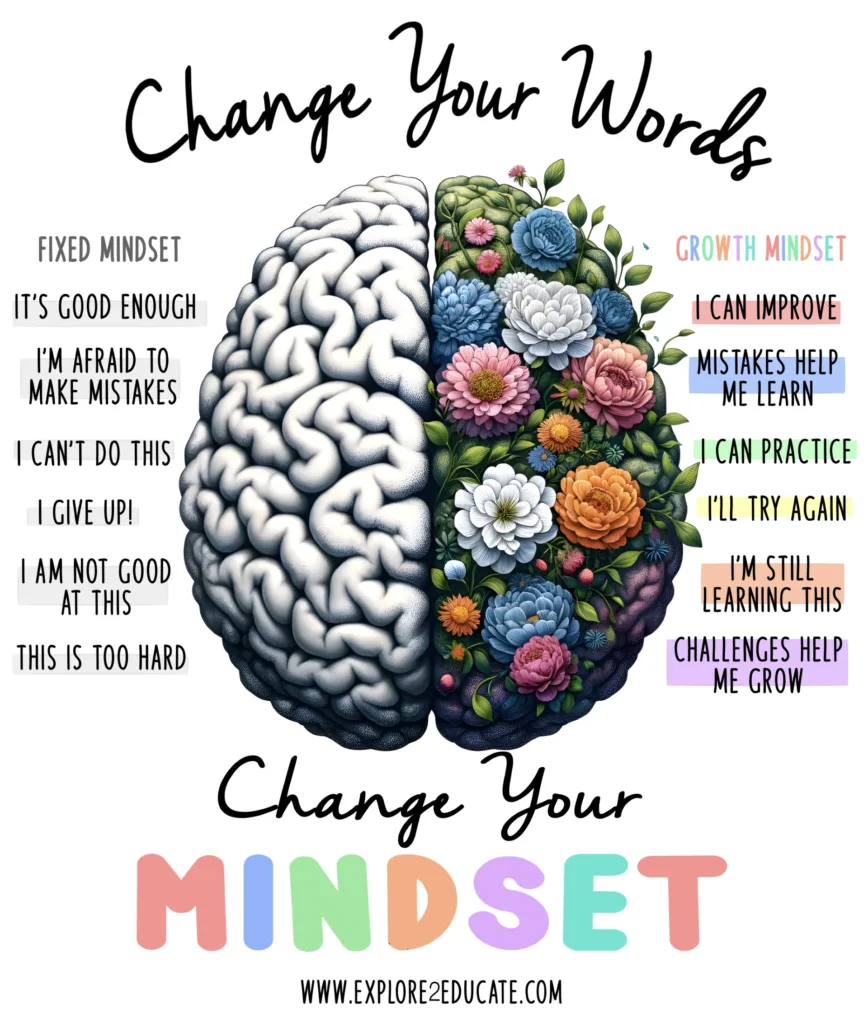Instilling a growth mindset in children is a fundamental pillar for developing resilient, confident, and curious learners. Whether your family is navigating the world of home education, embarking on a journey as travelling nomads, or blending various educational paths, a growth mindset can be the key to unlocking your child’s full potential.
Understanding The Growth Mindset
A growth mindset, a term coined by psychologist Carol Dweck, refers to the belief that abilities and intelligence can be developed through dedication and hard work. This contrasts with a fixed mindset, where abilities are seen as static and unchangeable. The benefits of a growth mindset are extensive, including resilience in the face of challenges, a love of learning, and the ability to persevere in achieving goals.
Strategies For Encouraging A Growth Mindset
For Young Children (Ages 3-7):
- Praise Effort, Not Just Achievement: Celebrate the process of learning rather than the end result. Phrases like “You worked so hard on that!” highlight the value of effort.
- Introduce Challenges as Adventures: Frame challenges as exciting opportunities to learn something new, encouraging an early appetite for discovery.
For Older Children (Ages 8-12):
- Encourage Problem-Solving: Offer opportunities for your child to solve problems on their own before stepping in to help. This builds confidence and critical thinking skills.
- Share Stories of Resilience: Discuss stories of individuals who overcame obstacles through persistence and effort, including historical figures, characters in books, or family members.
For Teenagers:
- Set Growth Goals: Encourage your teen to set personal growth goals, focusing on developing new skills or improving existing ones.
- Promote Reflective Thinking: Engage in discussions that encourage reflection on what was learned from challenges and how this learning can be applied in the future.
Leading by Example
Children learn a great deal from observing the adults in their lives. Demonstrating a growth mindset through your own actions can be incredibly powerful. Share your challenges, how you’re working to overcome them, and what you’re learning in the process. Your resilience, willingness to learn from mistakes, and openness to new experiences will serve as a model for your children.
The Benefits of a Growth Mindset
Adopting a growth mindset can transform the way children approach learning and life. It encourages adaptability, an essential skill in our rapidly changing world. Children learn to see failures not as insurmountable barriers but as stepping stones to success. This outlook can enhance their academic performance, improve their relationships, and build a solid foundation for lifelong learning.

The Science Behind The Concept Of A Growth Mindset
There’s a substantial amount of scientific research supporting the concept of a growth mindset and its positive impact on learning, motivation, and personal development. The foundation of this research was laid by Stanford University psychologist Carol Dweck, who has conducted numerous studies on the topic. Here are some key points that highlight the science behind a growth mindset:
- Neuroplasticity: Modern neuroscience has shown that the brain is far more malleable than previously thought. This concept, known as neuroplasticity, demonstrates that the brain can form new connections and pathways throughout life in response to learning and experience. A growth mindset leverages this adaptability, emphasizing that intelligence and abilities can improve with effort and practice.
- Motivation and Achievement: Research by Dweck and others has found that students who adopt a growth mindset are more motivated and perform better academically over time. This is because they view challenges as opportunities to improve, rather than threats to their intelligence or self-worth.
- Resilience to Failure: Studies have shown that individuals with a growth mindset are more resilient in the face of setbacks. They are more likely to persist after failure, viewing it as a natural part of the learning process. This resilience is linked to higher levels of achievement and lower levels of depression and anxiety.
- Impact on Feedback: The way people respond to feedback is also influenced by their mindset. Those with a growth mindset are more likely to seek out constructive criticism and use it to improve, while those with a fixed mindset may avoid feedback or respond defensively.
- Effects Across the Lifespan: The benefits of a growth mindset are not limited to children and adolescents. Adults, including teachers, parents, and workplace professionals, can also benefit from adopting a growth mindset. Research suggests it can lead to greater creativity, higher job satisfaction, and better coping strategies in the face of stress and change.
- Educational Interventions: Educational interventions aimed at fostering a growth mindset have shown positive outcomes. For example, teaching students about the malleability of the brain and the value of effort can lead to improvements in academic performance, especially in subjects like mathematics and science.
The science behind a growth mindset underscores its importance not just in educational settings, but as a fundamental approach to personal development and lifelong learning. It highlights the dynamic nature of human intelligence and ability, challenging the traditional view that these traits are fixed and unchangeable.
Fostering a growth mindset in children is a journey that starts with the smallest steps at home and extends to every aspect of their lives. By integrating these strategies into your daily routines, you can provide your children with the tools they need to thrive in any setting. Remember, the goal is to cultivate an environment where challenges are met with enthusiasm and learning is embraced as a never-ending adventure. Together, we can prepare our children for a future where they not only succeed but flourish.


